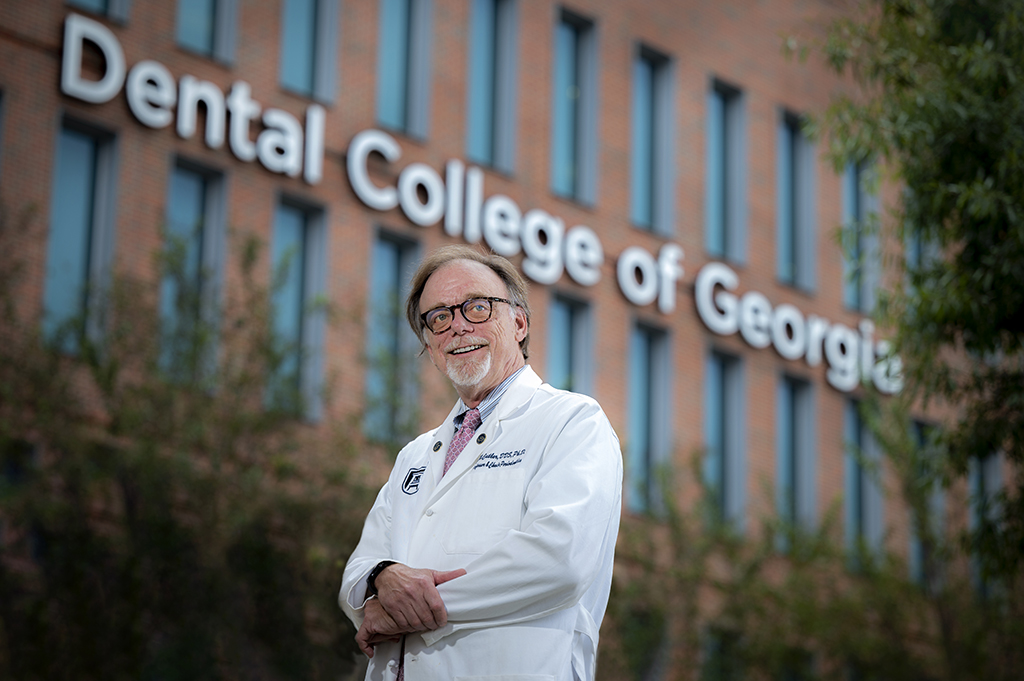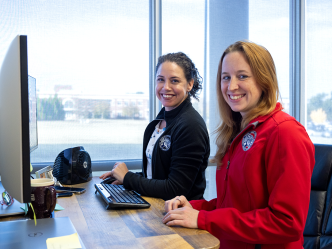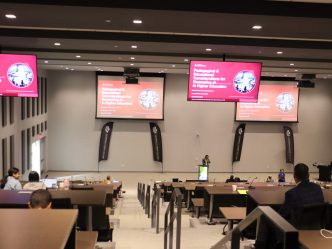Dr. Christopher W. Cutler, professor and chair of the Department of Periodontics at the Dental College of Georgia since 2011, has been awarded a five-year $1.8 million R01 grant from the National Institute of Health/National Institute of Dental and Craniofacial Research.
The research, “DC exosome therapy to resolve inflammatory bone loss and oral infection,” will support study of the immunobiology of custom-tailored dendritic cell-derived exosomes in the mouse model of experimental periodontitis.
Periodontitis is a severe gum infection that can lead to tooth loss and other serious health complications. With his research, Cutler hopes to find ways that antigen-producing cells derived from a patient’s blood can be trained to reprogram the body’s natural immune defense when fighting infection.
“We’re trying to dampen the body’s immune response, because that is what is actually causing the disease. Periodontitis is an inflammatory disease, like rheumatoid arthritis,” Cutler said.
Cutler said his work focuses on exosomes because they are “little packets of information that tell us what’s going on in the cells that they come from,” he said. Exosomes were identified only about 30 years ago, and a review of published research on them shows that interest in these tiny particles has picked up speed only in the last 10 years.
Technically, exosomes are lipid nanoparticles that shuttle proteins and information between cells. In layman’s terms, they are fatty microbubbles produced naturally by the body’s cells that carry messages and nutrients where the body thinks they need to go. There is a lot to learn about exosomes and their uses, but Cutler’s research is pointing toward new directions.
“We isolated these from the bone marrow of mice and blood of humans and reprogrammed them to do what we want them to do, so we don’t get as much bone destruction. We’re trying to block the bone destruction that we get around teeth. And at least in mouse models, it’s working,” Cutler said.
Mouse models allow researchers to observe the effect of a drug or process and any toxic effects before human studies.
“We have also begun isolating these cells from people with and without the disease, to see if they contain key clues about the disease process in humans and how it relates to the disease in mice,” Cutler said.
Researchers are analyzing the exosome cargo and stability as well as how the exosomes communicate with other immune cells. Once the needed diagnostic biomarkers are identified and researchers learn how best to manipulate the exosomes to suppress the bodily processes that cause periodontitis, they may be able to move on to human testing.
Grant funding from the NIH/NIDCR is important because it feeds not only the research process but also public interest in the DCG and the university. It helps to attract talented faculty and residents, and funds the creation of new knowledge for the public good.
“Successfully funded NIH research grants are the ‘tide that lifts all ships,’” Cutler said.
Currently, DCG and its programs have received seven NIH grants totaling more than $2.5 million.
Talent development is an ongoing and important focus for the DCG, as it feeds the future of research and instruction at Augusta University. A concurrent PhD-periodontics residency program was established in 2016 under Cutler’s leadership to address the shortage of academic periodontists. To date, the program has graduated two PhD-equipped periodontists who are now full-time assistant professors in Cutler’s department, with a third scheduled to graduate next fall.
“The goal of this program is to ‘grow our own’ by providing the training and the credentials to be outstanding clinician-educators that can compete for National Institutes of Health grants and integrate the clinical and research sciences,” Cutler said. Three of the graduates of the PhD program, Ahmed El-Awady, Mohamed Meghil and Ranya Elsayed, are currently faculty in the Department of Periodontics.
Mahmoud Elashiry, a resident in the Department of Periodontics, is another such candidate, who completed his master’s and PhD research in Cutler’s lab. His master’s project focused on a new 3D diagnostic approach for periodontal diseases while his PhD research explored new natural nano-immunotherapeutic modalities for inflammatory oral bone loss.
“Publishing the data of this research in a high-impact factor journal like Journal of Extracellular Vesicles and then being funded by NIH for the coming five years should make us proud and keen on continuing the journey to introduce new immunotherapeutic strategies for challenging disease like periodontitis and peri-implantitis,” Elashiry said.
“The proposed immunomodulatory therapy in this research, if shown to be effective in animal models and in humans, could change the way we treat this intractable inflammatory disease, periodontitis, particularly those cases that do not respond to conventional therapy. It could also reduce the inflammatory burden of periodontitis imposed on the body, which has been implicated in cardiovascular disease, Alzheimer’s disease and many other systemic disorders.”
 Augusta University
Augusta University




